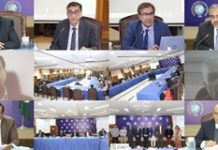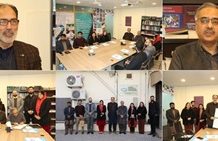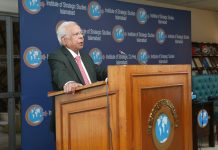Inaugural Address by Advisor to the PM on Foreign Affairs
Seminar on “Pakistan’s Non-Proliferation Efforts & Strategic Export Controls”
3 May 2016
Ambassador Khalid Mahmood,
Ambassador Masood Khan,
Distinguished Guests, Ladies and Gentlemen
It’s a great honor to have been invited by the Institute of Strategic Studies, Islamabad to deliver the inaugural speech at this Seminar on a topical issue “Pakistan’s Non-proliferation Efforts and Strategic Export Controls.”To begin with, I would like to commend the ISSI, for playing an important role in promoting debate and perspectives on subjects of national and international concern.
Pakistan is a peace loving country that was compelled to acquire nuclear deterrence in the face of grave threats to its security and integrity. Pakistan’s reluctant entry into the nuclear club is well documented. As a responsible state, Pakistan remains fully committed to the objectives of non-proliferation and disarmament and shares the global concern that proliferation of Weapons of Mass Destruction (WMDs) poses serious threat to international peace and security. In 1974, when the first nuclear test was conducted in our neighborhood, we made several proposals for keeping South Asia free of nuclear weapons and their delivery systems including simultaneous accession to NPT, but none of the proposals met a favorable response. Subsequently, in the interest of maintaining peace and stability in the region, Pakistan proposed a “Strategic Restraint Regime,” with three interlocking and mutually reinforcing elements i.e. conflict resolution, nuclear and missile restraint and conventional balance. This proposal remains on the table.
Ladies and Gentlemen
Pakistan has always endeavored to fulfill its international obligations. Pakistan is a state party various international instruments including CWC, BTWC, PTBT, CPPNM, IAEA Code of Conduct on Safety and Security of radioactive sources, and participates in the IAEA Incident and Trafficking Database (ITDB). Besides, we also actively participate in the Global Initiative to Combat Nuclear Terrorism (GICNT) and regularly submit reports to the UN Security Council 1540 Committee on the measures we take to exercise control over transfer of sensitive materials and technologies.
Pakistan is strongly committed to the objective of nuclear security and has been proactively engaged with the international community to promote nuclear safety and security.
Our nuclear security paradigm, evolved over the years, is effective and responsive against the entire range of possible threats. Nuclear security regime in Pakistan is dynamic and regularly reviewed and updated.
In line with the commitment made during the 2014 NSS, Pakistan has ratified the 2005 Amendment to the Convention on the Physical Protection of Nuclear Material (CPPNM). This is a reaffirmation of Pakistan’s confidence in its national nuclear security regime, which is consistent with the contemporary international standards.
Pakistan’s nuclear security regime is based on national legislative, regulatory and administrative framework. The elements of nuclear security in Pakistan include robust command and control system led by the National Command Authority (NCA), rigorous regulatory regime, comprehensive export controls and international cooperation. We follow the principle of multi-layered defence to prevent and effectively respond to the entire spectrum of threats. The regulatory regime encompasses all matters related to nuclear safety and security, including physical protection of materials and facilities, material control and accounting, transport security, prevention of illicit trafficking, border controls, and plans to deal with possible radiological emergencies through an elaborate Nuclear Emergency Management System (NEMS). A state of the art Centre of Excellence on Nuclear Security (PCENS) has been established, which continues to grow into a regional and international hub, with support of the IAEA.
Over the years, Pakistan has streamlined and strengthened its export control regime and enhanced its engagement with multilateral export control regimes. Pakistan’s export control regime is at par with the standards followed by the Nuclear Suppliers’ Group (NSG), Missile Technology Control Regime (MTCR) and Australia Group.
Ladies and Gentlemen
Let me also draw your attention to South Asia’s strategic stability, which has been negatively impacted by the policies that override the long established principles and norms and are guided by individual state’s strategic and commercial considerations. A case in point is the Indo-US civil nuclear deal and the subsequent discriminatory waiver granted to India by the NSG. Eight years down the road one wonders what benefit the non-proliferation regime has secured from the deal? The recent reports by NTI (Nuclear Threat Initiative), ISIS (Institute of Security and International Studies)and assessment by other experts corroborate that the NSG waiver has allowed India to exponentially increase its fissile material stocks with grave implications for the strategic stability of the region. The introduction of nuclear submarines, development of ABM system and massive acquisition of conventional weapons, prompt offensive inclinations manifested in doctrines such as the “Cold Start” and “Proactive Operations” pose a serious threat to regional stability. As we seek to ensure our security, credible minimum deterrence remains our guiding principle and our conduct will continue to be defined by restraint and responsibility.
Ladies and Gentlemen
Pakistan is facing acute power shortage as it is a fossil fuel deficient country. In order to meet its enormously increasing energy needs and to support sustained economic growth and industrial development, reliance on civil nuclear energy is an imperative. The energy requirement is expected to grow by at least 7 over the next two decades. Therefore, our national energy strategy includes expansion in the nuclear energy capacity.
Focus on nuclear security should further enhance international cooperation in peaceful applications of nuclear technology. Confidence in safety and security of nuclear and radiological materials and associated facilities should facilitate collaboration in health, industry, agriculture and other sectors. Pakistan has strong credentials to become a member of the Nuclear Suppliers Group and other multilateral export control regimes, on non-discriminatory basis. Pakistan is confident of its capabilities and cognizant of its international obligations. The policy of international community towards nuclear mainstreaming of any state should be based on uniform criteria rather than a country specific approach. After the objective of total nuclear disarmament was found difficult to achieve in the foreseeable future, the world has gradually evolved a new normative approach to non-proliferation. This new norm is now threatened by the so called selective approach to “outlier states”, without a uniform criteria applicable to all non NPT states. This threat must be resolutely resisted.
In the end, I once again extend my gratitude to Ambassador (Retired) Masood Khan and his team, for arranging this seminar. I am confident it will enhance your understanding about Pakistan’s efforts towards non-proliferation and strategic export controls.
*******














